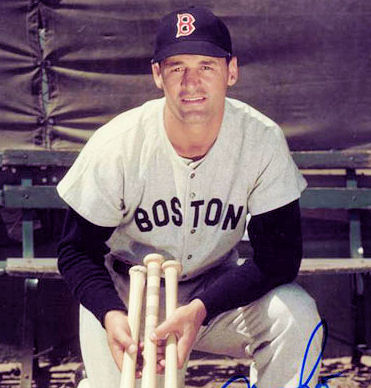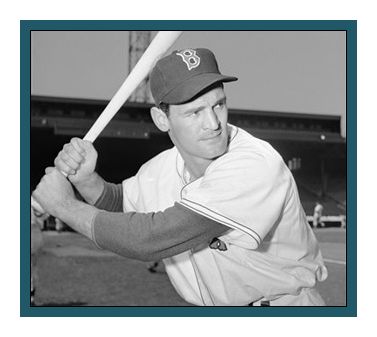|
“FENWAY'S BEST PLAYERS”  |
|||||
The Moose from Moosup was an easy nickname to pin on a 6-foot-5, 220-pound ballplayer who hailed from the village of Moosup, Connecticut. Right-handed-hitting Walt Dropo played for parts of 13 major-league seasons, with a solid .270 average and 152 career home runs. Dropo easily won the 1950 Rookie of the Year award. He never had another year approaching 1950, but what a year it was. The Red Sox rookie led the league in runs batted in, tied with teammate Vern Stephens with 144, despite being in the minor leagues at the start of the season. Dropo also led the league in total bases with 326, on the strength of 34 home runs, and placed second in both extra-base hits and slugging percentage. He also posted career marks in average (.322), runs scored (101), and hits (180.) Coming from a cold-weather climate, Walt was maybe always a bit of a long shot to play major-league ball. He was a superb multisport athlete at Plainfield High and the University of Connecticut. He was pursued by Chicago Bears owner-coach George Halas, who wanted to sign him to a pro-football contract with the Bears, and as the highest-scoring hoopman in Connecticut collegiate history, he was drafted by Providence’s short-lived pro basketball team, the Steamrollers. After he had a 1947 tryout at Fenway Park and owner Tom Yawkey pulled out his checkbook. Walt played in Fenway Park almost six years before his major-league debut. On July 12, 1943, a group branded Ruth’s All-Stars played an exhibition game at Fenway against the Boston Braves to benefit the war effort. There weren’t enough available major leaguers to fill the All-Stars’ roster, so a call was made to Fort Devens. After his sophomore year at UConn, he had joined the Army and trained at Devens. He and some others traveled into Boston to play. Walt, Ted Williams, Dom DiMaggio, Babe Ruth, and company beat the Braves. Serving in World War II, Corporal Dropo saw duty with the Army Corps of Engineers rebuilding bridges in Italy, France, and Germany, and building morale by playing ballgames in Europe. He was in Munich when the war ended; and served an additional eight months in Europe playing in games for Special Services and the USO. Mustered out in January 1946, he returned to the University of Connecticut and played with the Huskies just a month later. He played more baseball in the spring and football in the fall, taking part in an East-West All-Star basketball game in March 1947 at Madison Square Garden in New York. Immediately after graduation, he signed with the Red Sox, and played for the Scranton (Pennsylvania) Miners. He began to move up in the Sox farm system and in 1948, he trained in the spring with the big-league club and was assigned to Triple-A Louisville. He hit poorly though, and was sent down to Birmingham of the Southern Association, where he blossomed. His .359 average and his nine home runs in the playoffs helped secure the Southern Association flag for the Barons. He made his major-league debut in 1949, at Shibe Park. He started 10 more games at first base but was sent to Sacramento of the Pacific Coast League. When the Red Sox’ Billy Goodman suffered a chipped ankle early in 1950, Walt was summoned from Louisville and seized the opportunity. The hits and runs and numbers began to mount quickly enough that he was named to the All-Star Game in midseason and won the Rookie of the Year Award at season’s end. He struggled in 1951 and in late June, so he was optioned to San Diego. Recalled a month later, he finished the season batting .239. In June of 1952, he was part of a nine-player trade that sent him, Johnny Pesky, and three other Red Sox to Detroit for George Kell, Dizzy Trout, Johnny Lipon, and Hoot Evers. After retirement, Walt remained active attending Red Sox alumni events and enjoyed working as an instructor at Red Sox fantasy camps for many years, but as baseball became a much bigger enterprise, he chose to keep more to himself. His last public appearance was at the tribute to Ted Williams held at Fenway Park shortly after Walt's childhood idol passed away in 2002. Walt Dropo died on December 17, 2010 at the age of 87.
|
|||||

